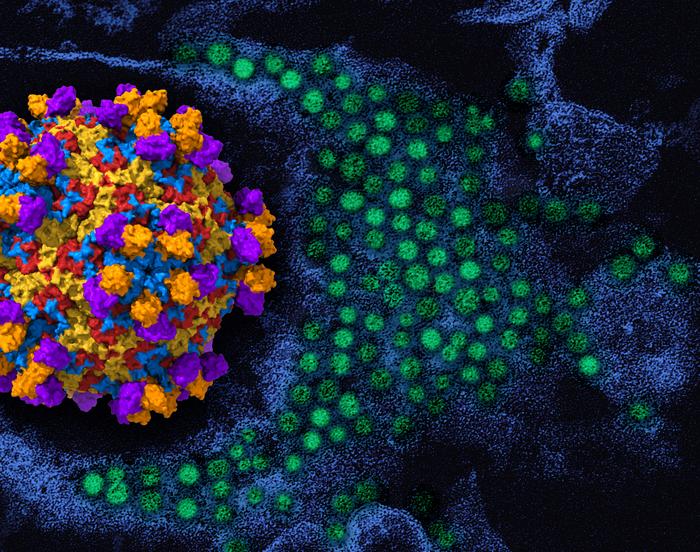The National Institutes of Health (NIH) is sponsoring a clinical trial to evaluate the safety of an investigational monoclonal antibody to treat enterovirus D68 (EV-D68), which can cause severe respiratory and neurological diseases such as acute flaccid myelitis (AFM) – similar to polio. Scientists are striving to better understand AFM, which has emerged in the United States with spikes in cases every other year, primarily in the late-summer months over the last decade. The U.S. Centers for Disease Control and Prevention (CDC) identified increases in AFM cases in 2014, 2016, and 2018. EV-D68 is a virus of growing public health concern due to its association with the intermittent AFM outbreaks.

Credit: NIAID and CDC
The National Institutes of Health (NIH) is sponsoring a clinical trial to evaluate the safety of an investigational monoclonal antibody to treat enterovirus D68 (EV-D68), which can cause severe respiratory and neurological diseases such as acute flaccid myelitis (AFM) – similar to polio. Scientists are striving to better understand AFM, which has emerged in the United States with spikes in cases every other year, primarily in the late-summer months over the last decade. The U.S. Centers for Disease Control and Prevention (CDC) identified increases in AFM cases in 2014, 2016, and 2018. EV-D68 is a virus of growing public health concern due to its association with the intermittent AFM outbreaks.
There are no Food and Drug Administration-approved treatments for severe EV-D68 infection or AFM. Standard care is limited to supportive treatment and treatment for immune disorders, which has not been comprehensively evaluated. EV-D68 likely spreads from person to person when an infected person coughs, sneezes, or touches a surface that is then touched by others.
Between 2017 and 2019, scientists at Vanderbilt University Medical Center, Nashville, Tennessee, identified and isolated a neutralizing antibody, called EV68-228, from patients recovering from EV-D68 infection. Then, with collaborators from Utah State University, KBio, Inc., and ZabBio, the scientists developed an experimental antibody, called EV68-228-N, for testing. In laboratory models, the monoclonal antibody potently neutralized multiple clinical EV-D68 strains across multiple epidemic years. Kbio, Inc., is using its plant-based protein development platform to manufacture EV68-228-N.
Led by principal investigator C. Buddy Creech, M.D., M.P.H., at Vanderbilt University Medical Center, the Phase 1 study sponsored by NIH’s National Institute of Allergy and Infectious Diseases (NIAID) will evaluate the safety of EV68-228-N, how long it lasts in the body, and the most effective dose. The trial also will enroll participants at the University of Maryland, College Park, and be led by E. Adrianne Hammershaimb, M.D. The study is being conducted in collaboration with academic medical centers across the U.S. through the NIAID-funded Infectious Diseases Clinical Research Consortium, which includes the NIAID-funded Vaccine and Treatment Evaluation Units.
Clinical Trial NCT06444048 will enroll 36 healthy volunteers ages 18 to 49. Six will receive a placebo (control group) and 30—in groups of 10—will receive either a 3, 10 or 30 mg/kg dose of EV68-228-N intravenously. As part of the safety evaluation, scientists will monitor the first two study participants in each group receiving the experimental treatment for at least 72 hours before others receive the infusion. Researchers will then monitor and evaluate study participants during nine subsequent in-person examinations over the next 120 days.
According to the CDC, EV-D68 was first identified in California in 1962 and is one of more than 100 non-polio enteroviruses. EV-D68 typically causes respiratory illnesses that are mild. Non-polio enteroviruses are very common. Most infections are asymptomatic or cause mostly mild symptoms, such as runny nose, sneezing, cough, rash, mouth sores, body aches, and muscle aches. Severe symptoms may include wheezing and difficulty breathing.
Beginning in 1987, physicians and public health officials began reporting sporadic EV-D68 cases to CDC. However, between August and December 2014, EV-D68 caused an outbreak of respiratory illness in the U.S. and 120 cases of AFM in 34 states. This raised awareness of EV-D68-associated illness and, beginning in 2014, CDC surveillance for EV-D68 expanded. EV-D68 and cases of AFM have been subsequently detected in the U.S. every year, mostly in late summer and early fall, with pronounced spikes in 2016 and 2018.
NIAID conducts and supports research—at NIH, throughout the United States, and worldwide—to study the causes of infectious and immune-mediated diseases, and to develop better means of preventing, diagnosing and treating these illnesses. News releases, fact sheets and other NIAID-related materials are available on the NIAID website.
About the National Institutes of Health (NIH): NIH, the nation’s medical research agency, includes 27 Institutes and Centers and is a component of the U.S. Department of Health and Human Services. NIH is the primary federal agency conducting and supporting basic, clinical, and translational medical research, and is investigating the causes, treatments, and cures for both common and rare diseases. For more information about NIH and its programs, visit www.nih.gov.
NIH…Turning Discovery Into Health®




